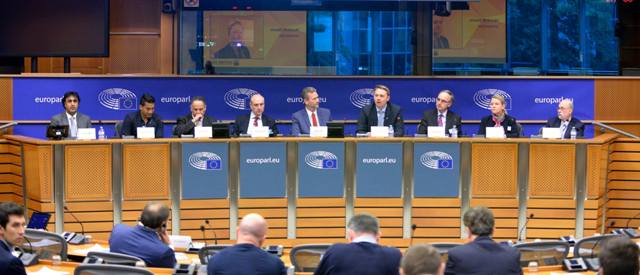Leading experts on religious freedom converged a the EU Parliament in Brussels on June 5th to highlight concerns about the erosion of freedom of belief for Christians in Europe.
The symposium hosted by the EFDD Group at the Parliament of the European Union brought together voices from the Christian community across Europe and the UK, at the European Parliament in Brussels, Belgium. The gathering entitled “Religious Freedom in Europe: A Christian Case Study” wove together presentations from politicians, legal experts, and human rights organizations discussing shifting policies in a European context that target adherents to the Christian faith. The most compelling were the testimonies of experiences by individual Christians have faced for engaging in simple faith practices and standard beliefs as they go about their daily lives.

MEP Nathan Gill at the Symposium
Part 1 reviewed the historical development and promotion of Freedom of Religion and Belief in Europe. Introductory remarks were made by Nathan Gill, EFDD MEP who organised and presided over the event. Then an introduction of the subject was given by Hendrick Storm, CEO Barnabas Fund; and an Analysis and Historical Overview was presented by Dr Martin Parsons, Head of Research at Barnabas Fund.
Part 2 covered the current situation of Religious Freedom and Belief in Europe with a special focus on Christians.
Ellen Fantini, Observatory on Intolerance and Discrimination against Christians in Europe spoke on; The current situation for Christians in Europe. The role of the observatory is to research, analyze, document, and report cases of intolerance and discrimination against Christians in Europe; inform and educate the public, lawmakers, and international institutions about the range of hostilities and marginalization Christians and Christian institutions face in Europe by providing reliable and objective data; empower Christians to tell their stories and freely live their faith in the public square; advocate for remedies; and emphasize the vital role religion plays in a mature and peaceful society. Their 2018 report outlines 500 cases hostility against Christians in their everyday lives in the years 2016 and 2017.
David Fieldsend, Office of the Archbishop of Canterbury in Europe presented on The effectiveness of institutions and national governments in upholding Freedom of Religion for Christians and others.
An overview of the situation for Christians in the UK was given by Paul Diamond of Christian Legal Centre which covered recent cases of Christians being singled out for what would be acceptable from those of other faiths. Staff members sanctioned for visible expressions of faith such as wearing confirmation crosses by employers or student being told they cannot wear purity rings at educational institutions; successful foster parents being told they are unfit because they do not actively promote homosexuality; or a nurse being accused of bullying when she prayed for a co-worker after being requested to do so – all reflect a growing societal marginalisation of Christians.

Wilson Chowdhry
Wilson Chowdhry, British Pakistani Christian Association shared The experience of Pakistani Christians in the UK and outlined the impact of kaffirophobia on society and the particular harm that can come to those who have changed their religion from Islam to another philosophical view and are considered apostate especially targeted Christians. One testimony Mr Chowdhry relayed was that of Mohammed Fyaz who has suffered such intense persecution from his family in community since becoming a Christian he has chosen to remain single.
In relation to this direct experience of intolerance by his ethnic community Mr Fyaz said: ‘Multiculturalism and freedom of speech have not failed Muslims. In fact it is Muslims, in particular the Pakistani communities who have failed to embrace multiculturalism and freedom of speech. My community needs to look hard at itself…’
Mr Fyaz has recently published a book on his conversion ‘Letting Love win” which can be bought on the BPCA website (click here)
Mike Overd, Evangelical Street Preacher was charged with and later acquitted of a hate crime for preaching from 1 Corinthians 6 because his intention was to preach the Gospel. He gave a rousing account of how despite attempts to silence him by UK police he continued to preach the Gospel despite three arrests and three acquittals.

Nissar Hussain
Nissar Hussain was invited to speak at the event by the BPCA. Nissar is a Christian convert from Islam who suffered 18 years of persecution in the UK and was not taken seriously by the authorities as they could not understand the hatred apostates face. He was bullied in his neighbourhood while Muslim city councillors drank tea with his persecutors; and MP Naz Shah, who was later deemed anti-Semitic (click here), wrote off his complaint as a neighbourhood dispute. He was being targeted for his faith and along with his family needed to be escorted from his residence by armed police guards after they advised him his life was in serious danger and they could not protect him. He has had his car smashed by vandals on average six times a year and in 2015 was beaten within an inch of his life by two men with pick-ax handles. The brutal attack on Nissar was caught on video (click here).
In Part 3 concluding remarks predicting the future on Freedom of Religion and Belief in Europe were shared and recommendations given by Dr Martin Parsons, Head of Research, Barnabas Fund and Nathan Gill, EFDD MEP and were then followed by an official Statement from Mr Mikhail Dobkin MP, Parliament of Ukraine. Dr Parsons articulated that the circumstance of Christians in Europe is much like a frog in a kettle, which will react to a sudden surge in heat, but that societal attitudes have gradually shifted and have heated up over a long period. He identified “twin threats” from radical Islam particularly in sharia enforcement and attempts to introduce global Islamic blasphemy law; and from a rise of intolerant in secular liberalism namely in the redefinition of ‘tolerance’ ; rise of political correctness and identity politics; and the rise of ‘illiberal liberalism’ that assumes there is no God.
MEP Nathan Gill, spoke after the event, he said:
“This morning, here at the European Parliament in Brussels, I held what I believe to be the first ever event, at the European Parliament, on the topic of the discrimination of Christians here in Europe.
“I was pleased to be joined by the Barnabas Fund, the Observatory on Intolerance and Discrimination Against Christians in Europe, the British Pakistani Christian Association, Christian Concern and Mike Overd and Nissar Hussain, who have both experienced arrest and assault for their Christian faith.
“We explored the history of religious freedom here in the UK and Europe and then we talked about the current situation for Christians in the European Union, with a particular focus on the UK.
“Attacks and discrimination against Christians in Europe are rising and we most first promote awareness of this situation and then enact legislation to protect our right to worship.
“I was honoured to have hosted such an important event. It’s the first time that Christianophobia within Europe has been discussed at the European Parliament. There has often been a focus on Christian persecution around the world, but seldom do we look at what is happening on our doorstep. It’s important to raise awareness that our rights as Christians are being eroded. We need to stand together as practising Christians to oppose religious intolerance.”
Wilson Chowdhry, Chairman of the BPCA, said:
“Christians in Europe find they are increasingly marginalised for their faith in Europe as their number of adherents dwindle. A study must be undertaken on whether this is a consequence of the number of practising Christians being a minority or simply a backlash on the perceived mistakes of ancient Christendom.
“From unfair employment practices that prevent the wearing of jewellery with Christian symbols whilst those of other faiths are allowed to adorn themselves with similar items with religious significance, to restrictions on their freedom of speech and belief Christians are uniquely impacted upon in nations where they hold a proven majority – though numbers are significantly bolstered by nominal Christians.
“More alarmingly the evidence that we the BPCA submitted illustrates that their is a palpable level of persecution towards new converts to Christianity and other belief systems that leave Islam. A report that we have submitted to the UK Hate crime Inquiry, provides tangible evidence of this kaffirophobia or apostasy-hatred, through a number of real-life case-studies.
Read BPCA UK Home Office, Hate Crime Inquiry report (click here)
“This hatred by some Muslims for non-believers have seen a number of asylum seekers across Europe and particularly in Britain receive brutal treatment (click here). We believe this is a consequence of the increased vulnerability of the Christians asylum seekers who are seen as traitors to their former nations, often by Muslims surprised by their existence.
“The increased radicalization of young Muslims in the UK is a bad omen for British society which has become increasingly polarized in recent years. Much of the polarization is based on a desire by the majority of Muslims in Britain espousing the adoption of Sharia law on our shores.
“A survey for channel 4 taken ten years ago suggested 25% of British Muslims supported the adoption of Sharia law in the UK and 30% of 16-24 year-olds (click here). It is assumed even larger percentages of today’s Muslim youth support Sharia. Sharia law if adopted in the UK would reduce the rights of women who could be divorced by the simple utterance of divorce three times by a Muslim husband and would allow murderers to escape justice by paying a bribe to victim families often under duress (click here).
Moreover if Sharia Law was introduced the the UK and Islam became a majority faith, this could hearken the onset of dhimmitude (click here) that would require an additional tax to be imposed on non-Muslims for their protection, these are laws that contravene the Judeo-Christian principles currently championed by international laws.
“Sharia law imposed in Islamic nations is proven to undermine the rights of minorities and the blasphemy laws of Pakistan for instance are regularly used to settle personal vendettas or appropriate forcibly property or possessions from Christians and other minorities. Sharia law and the heavier weighting of Muslim testimony has also made it almost impossible to free the estimated 700 Christian girls kidnapped, raped and forced into Islamic Marriage every year in Pakistan (click here).
“The UK Government and its people must consider carefully what trajectory the country wishes to head along and religious freedoms, gender equality and the rule of law must be enshrined in our future legal structures ad judicial system, which must remain equal and fair. The only way this can work is for their to be one rule of law for all our constituent diversities that will be exempt from their biases of any faith.”


